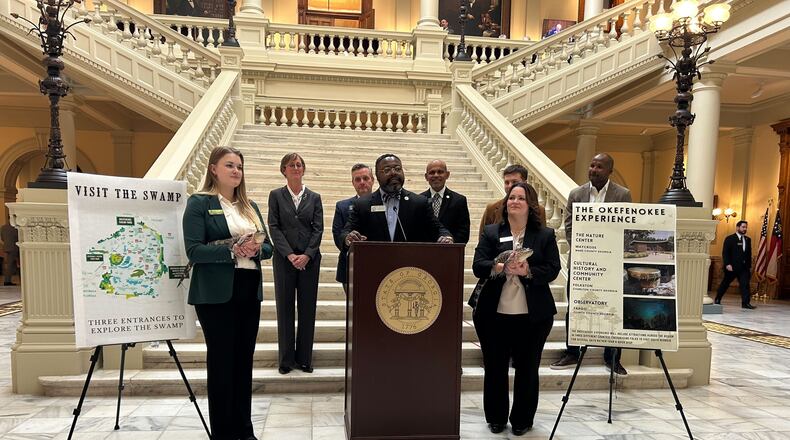This coverage is made possible through a partnership with WABE and Grist, a nonprofit, independent media organization dedicated to telling stories of climate solutions and a just future.
Researchers in Southeast Georgia are working to uncover a little-known piece of Okefenokee Swamp history: the story of the team of Black workers who helped open it up to visitors. Okefenokee Swamp Park has received nearly $500,000 in federal funding for the project.
During the Great Depression, a New Deal program called the Civilian Conservation Corps employed young Americans in conservation work across the country. The CCC sent a unit of nearly 200 Black workers, known as Company 1433, to what’s now the Okefenokee National Wildlife Refuge.
“These gentlemen were housed in the Okefenokee National Wildlife Refuge and were responsible for excavating and digging a lot of the water trails, which is about 120 miles of trails that we use today,” said Okefenokee Swamp Park Executive Director Kim Bednarek.
But their story isn’t well known. So the park has used its federal funding to hire a pair of archivists to find information, pictures, and other material about the group. They’ll also work with people in the surrounding communities, some of whom are descendents of Company 1433 members who settled in the area.
“I do think it’s forgotten history for most – not for all,” said Bednarek. “I think this is this really unique opportunity to sort of uncover the story and to encourage the families of Company 1433 to also share their stories.”
The project launched at the beginning of February to mark the start of Black History Month, but the archival work is expected to take several years. Eventually, Bednarek said, the plan is to set up a permanent exhibit so visitors to the Okefenokee can learn about this chapter of its history.
“This community-driven project reflects the power of storytelling and honors the historical contributions of Black conservationists in South Georgia,” said Senator Raphael Warnock, who secured funding for the project, in a video message for the launch. “It will provide Georgians and folks around the world an educational experience that will help promote understanding and appreciation of the region’s historical and cultural significance.”
The park is also highlighting its economic impact in Southeast Georgia as part of a bid for UNESCO World Heritage Site designation. Officials gathered at the state capitol Thursday to announce the findings of an economic impact study completed as part of that effort.
The report by the Conservation Fund, which supports the heritage site bid, found that 800,000 people visit the Okefenokee annually and spend $91.5 million in the counties around it. It estimates that a World Heritage Site designation coupled with planned infrastructure improvements could double visitorship, add another $60 million in annual economic impact, and bring up to 750 jobs to the area.
World Heritage Sites are places deemed to have historical, cultural, or scientific significance. The National Park Service announced last year it would nominate the vast Okefenokee Swamp.
The economic impact study is significant beyond the UNESCO bid because of the proposal for a mine near the swamp. Proponents of the mine say it would bring much-needed jobs to the area. But many scientists and environmental advocates worry mining nearby could harm the swamp – which they point out supports local jobs that could dry up if the Okefenokee were damaged.
Credit: Grist
Credit: Grist
MEET OUR PARTNER
This story was originally published by our partner, Grist, a nonprofit media organization covering climate, justice, and solutions. Sign up for their newsletter here.
If you have any feedback or questions about our partnerships, you can contact Senior Manager of Partnerships Nicole Williams via email at nicole.williams@ajc.com.
About the Author
The Latest
Featured




